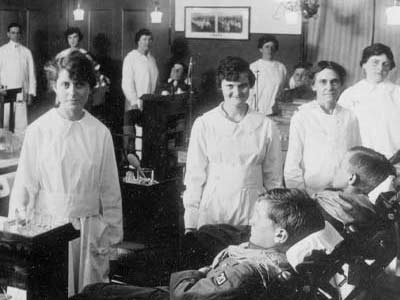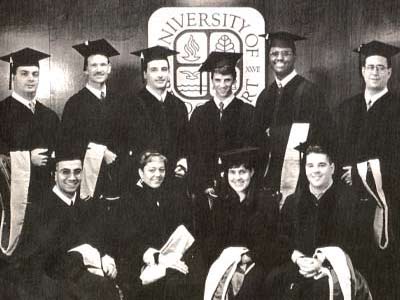The History of UB
In the early twentieth century, Bridgeport was one of only six U.S. cities with populations of more than 100,000 people with no institution of higher education. Local physics and mathematics teacher E. Everett Cortright believed equal access to education was necessary for national success, stating, “Ability and leadership must be sought in all groups.” He and two friends, Alfred Fones, founder of the dental hygiene profession, and Raybestos President Sumner Simpson, decided to create a two-year junior college, the first one in New England.

Dr. Alfred Fones Establishes the World’s First School of Dental Hygiene
In 1907, Irene Newman first performed the duties of what her cousin, Dr. Alfred Fones, called a “dental hygienist” at their offices on Washington Street in Bridgeport. By 1913, she was instructing the first courses to members of this new profession. Connecticut issued the world’s first license to Newman, and she became the president of the world’s first dental hygiene association. Dr. Fones went on to help found the Junior College of Connecticut, which later became University of Bridgeport. Fones and Newman’s legacy was secured when UB opened the Fones School of Dental Hygiene in 1949. A year later, when asked about her part in this saga, she said, “The work was there to do, and I did it.” Today, graduates of the Fones School continue to achieve national recognition as pioneers in the dental profession.
On May 5, 1927, the state charter for the Junior College of Connecticut was signed to resounding local and regional acclaim. Dr. Fones bought a large brick building at 1001 Fairfield Avenue to use as the first college building. Aspiring men and women entered the new college to take general education classes, as well as specialties like Hungarian and aeronautics. Almost immediately, President Cortright realized that the college needed to grow, and in 1939, he purchased more property, including P.T. Barnum’s former estate near Seaside Park.
At the end of World War II, veterans flooded the school, taking advantage of the GI Bill® — a legislative act securing educational benefits for service people. The new president, James Halsey, saw this as an opportunity to expand the successful junior college into a full university, and students agreed, signing petitions and writing to newspapers. In 1947, the school became University of Bridgeport, located on the former Barnum estate adjacent to Seaside Park. The new university absorbed Arnold College of Physical Education and Weylister Secretarial Junior College, becoming one of the largest schools in Connecticut.
As the decades progressed, new majors and schools were added, contributing to a range of ideas and opportunities that have distinguished the University ever since. Health Sciences grew from its roots in Dental Hygiene to include the first BS in Nursing program in Connecticut, the first master’s degree in Nutrition in the country, and the first university-based Chiropractic program in America. Inventor Igor Sikorsky helped UB begin what became in the 21st century one of the largest engineering programs in New England, with the first and only Ph.D. program in Technology Management in the Northeast, the first Ph.D. in Computer Science and Engineering in the Northeast, and the first university with a master’s degree in Artificial Intelligence in Connecticut.

UB Institutes America’s First University-Based Chiropractic Program
The first master’s degree in nutrition in America had attracted many chiropractors, and as a result, the University began exploring the foundation of a College of Chiropractic. In 1991, UB became not only the first such school in Connecticut, but the only university-affiliated chiropractic school in America. Pioneering chiropractic physician Frank Zolli served as dean, ensuring that from anatomy labs to clinical rotations, the hands-on curriculum was evidence-based, science-driven, and research-centered. Never before had a college achieved accreditation on its initial application to the Council on Chiropractic Education, but in 1994 UB became the first. That year the inaugural class of ten students graduated.
In 2021, Goodwin University preserved the legacy of University of Bridgeport when it completed its acquisition of the school. Under this ownership, UB continues to function as an independent institution with renewed energy and commitment from its own leadership and Board of Trustees. This partnership continues the tradition of innovative higher education that led to the founding of UB almost a century ago and continues to guide us today as we connect to an increasingly global society.
